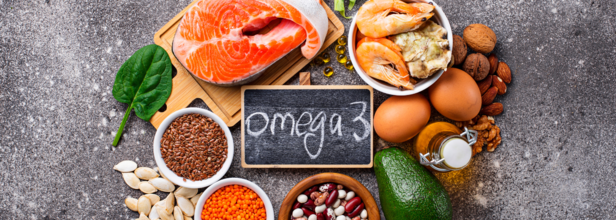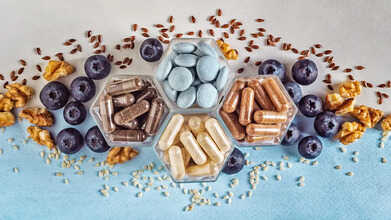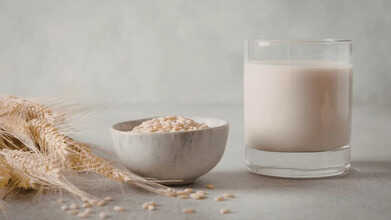- Health Conditions A-Z
- Health & Wellness
- Nutrition
- Fitness
- Health News
- Ayurveda
- Videos
- Medicine A-Z
- Parenting
Can Omega-3-rich Food Slow Prostate Cancer Growth?

Can omega-3-rich food slow prostate cancer growth? (Credits: Canva)
As per the American Cancer Society, there were about 299,010 new cases of prostate cancer in the United States in 2024, with 35,250 deaths. About 1 in 8 men in their lifetime are diagnosed with prostate cancer in their lifetime. It is also the most commonly diagnosed cancer in males in 118 of the 195 countries, and leading cause of death in 52 countries. In the US, it is the 2nd leading cause of cancer death and the most common cancer in men in the US, aside from non-melanoma skin cancer. Is there something that can lower the risk of prostate cancer? Well, an earlier research published in the Journal of Clinical Oncology suggests that men with low-risk prostate cancer who choose "watchful waiting" over immediate treatment may benefit from incorporating fish oil supplements into their diet. The study therefore explores how eating Omega-3-rich food and adding those dietary changes could influence cancer growth and potentially delay the need for aggressive interventions like surgery or drug therapy.
ALSO READ: UK Launches Men's Health Strategy As Survey Reveals Men Live Shorter Lives
What Does Prostate Cancer Means?
Prostate cancer is a type of cancer that occurs when malignant cells form in prostate gland, which is a walnut-sized gland in male reproductive system.
Prostate cancer treatment guidelines have shifted its path a bit in the recent years, with many men opting for active surveillance rather than immediate treatment for slow-growing tumors. However, about 50% of men on "watchful waiting" will require further treatment within 5 years because of the tumor progression. This is what triggered many researchers to aim and identify whether dietary modifications, specifically increasing omega-3 fatty acids, could prolong this surveillance period and slow down the tumor progression.
How was the study conducted?
The study analyzed 100 men who were diagnosed with low-risk or "favorable intermediate" prostate cancer. Participants were then divided into two groups: one continued with their usual diet, while the other received counseling to increase omega-3 intake through fish oil supplements and dietary adjustments. The intervention group was also advised to reduce omega-6 fats, commonly found in processed and fried foods like chips, cookies, and mayonnaise.
ALSO READ: Cancer Deaths Among Men Predicted To Surge By 93% By 2050: Key Factors And Overlooked Symptoms
What did the study find out?
The researchers then tracked whether there was any impact on the participants. For this, the researchers then measured each participant's Ki-67 index, a biomarker indicating the rate of cancer cell multiplication. After one year, men in the omega-3-focused group showed a 15% decline in their Ki-67 index, signaling a slowdown in cancer cell growth. In contrast, men who maintained their usual diet experienced a 24% increase in the same marker, indicating faster tumor progression.
Despite these promising results, the study found no changes in the Gleason grade—a key metric for assessing prostate cancer severity—among participants. This suggests that while omega-3 supplementation may slow cellular growth, however, it will not lessen the overall aggressiveness of the cancer.
The findings highlight the potential of dietary adjustments as part of prostate cancer management, though further research is necessary to determine long-term outcomes. For now, incorporating omega-3-rich foods like fish or supplements into a balanced diet may offer a simple and non-invasive strategy to support men opting for active surveillance.
RFK Jr.’s New Food Pyramid vs Old Food Pyramid: Know What All Has Changed In Dietary Guidelines For Americans

Credits: Canva/Politico
The U.S. Department of Agriculture (USDA) rolled out a new set of dietary guidelines on Wednesday, Jan. 7, introducing a food pyramid that looks strikingly different from what most people remember. Emphasizing protein and healthy fats while reducing the role of grains, the updated recommendations represent a clear break from previous federal guidance. The accompanying food pyramid graphic almost completely reverses the old model, both in appearance and in the food groups it promotes.
During a White House briefing, Press Secretary Karoline Leavitt highlighted the changes, saying the announcement aligned with President Donald Trump and Health Secretary Robert F. Kennedy Jr.'s mission to "Make America Healthy Again."
Also Read: New Food Pyramid 2026 Reshapes Dietary Guidelines For Americans Under RFK Jr
If you’re used to the pyramid from the early 2000s, it may take a moment to adjust to the new look. Here are some of the major differences between the old and new food pyramids.
New Food Pyramids 2026: What Does The New Food Pyramid Look Like?
The U.S. had stopped using the pyramid as a guide back in 2011, switching to a plate-style visual for dietary recommendations. Now, under RFK Jr.’s leadership at HHS, the pyramid is back—but flipped. The upside-down triangle now places the foods that should make up most of your diet at the top, while foods to eat sparingly sit at the bottom.
RFK Jr.’s New Food Pyramid vs Old Food Pyramid
It’s not just the graphic that’s changed. The hierarchy of food groups has shifted as well. Grains, once the largest and foundational part of the diet, are now the smallest segment at the bottom. Meanwhile, protein, dairy, healthy fats, fruits, and vegetables dominate the top of the pyramid.
Here’s a detailed look at RFK Jr.’s New Food Pyramid vs Old Food Pyramid and what it means for Americans, based on reporting from USA Today.
1. Focus Shift
Old Food Pyramid: Grains and carbs were the base, while proteins and fats were limited. The focus was on low-fat foods and staples like bread, pasta, and cereal.
RFK Jr.’s New Food Pyramid: Whole foods, protein, and healthy fats take center stage. Red meat, cheese, fruits, and vegetables are placed at the top, and refined grains play a smaller role.
2. Protein and Fats
Old: Saturated fats and animal proteins were discouraged. Fat was often treated as the main dietary enemy.
New: Protein and healthy fats, including saturated fats from meat and dairy, are now seen as essential. Federal nutrition leaders have officially declared an end to the “war on fat.”
3. Processed Foods
Old: Highly processed foods, added sugars, refined carbs, and chemical additives were allowed in moderation.
New: There’s a strong push to reduce ultra-processed foods, added sugars, and refined carbs. The emphasis is now on minimally processed, real foods.
4. Dairy
Old: Low-fat or skim dairy was recommended; full-fat options were generally discouraged.
New: Cheese and other dairy products are now at the top of the pyramid, allowing for full-fat milk in both general diets and school meals.
5. Sugar and Additives
Old: Sugar intake was suggested to be limited, but highly processed foods weren’t heavily flagged.
New: Added sugar is more strictly controlled, and processed foods are clearly marked as foods to minimize.
6. Overall Approach
Old: The diet centered on lowering fat, balancing calories, and relying heavily on plant-based staples such as grains.
New: The focus is on nutrient-rich, protein-heavy meals, healthy fats, whole foods, and cutting down refined carbohydrates. The guidelines aim to address obesity, chronic disease, and overall health.
How Does The New Pyramid Reflect Dietary Trends?
The new food pyramid, unveiled by Health Secretary Robert F. Kennedy Jr., signals a major shift in U.S. nutrition advice, emphasizing more protein and healthy fats while reducing grains. This change mirrors growing trends in American diets, where high-protein eating patterns and skepticism of high-carb, ultra-processed foods are increasingly common, according to USA Today.
Practically, protein and dairy, especially full-fat dairy, now dominate the pyramid, replacing the previous grain-heavy base. Saturated fats are no longer demonized; instead, they are considered healthy in moderation. Federal nutrition leaders have officially ended the “war on fat.” These updates also reflect recent survey findings showing that high-protein diets are a top trend in the U.S., with most Americans actively trying to increase their protein intake.
Supplements, Gummies, Or Whole Foods? Here’s What Experts Recommend

Credits: Canva
In a world where colourful vitamin gummies line supermarket shelves and powders promise instant wellness, many people are left wondering: should I really rely on supplements, or is eating well enough? Experts say the answer isn’t as simple as choosing one over the other.
Why Natural Foods Come First
Dr. Hari Kishan Boorugu, Consultant Physician and Diabetologist at Yashoda Hospitals, Hyderabad, emphasizes that “whole, natural foods should always come first.” Fruits, vegetables, whole grains, nuts, seeds, fish, yogurt, and healthy oils are packed with vitamins, minerals, fibre, antioxidants, and other plant compounds that work together to support digestion, immunity, heart health, and gut microbiome balance. “Supplements can’t fully replicate the synergy of nutrients found in real foods,” he adds.
Supplements, including tablets, capsules, powders, and even gummies—are meant to fill specific gaps. They are particularly useful for people with diagnosed deficiencies, dietary restrictions, pregnancy-related needs, ageing-related bone health, or medical conditions that affect nutrient absorption. But Dr. Boorugu cautions that “self-prescribing or overusing supplements can lead to nutrient imbalances or even toxicity, especially with vitamins A, D, E, and K.”
The Truth About Gummies
Gummies have become popular for their taste and convenience. Yet, experts warn that they are not a substitute for a balanced diet. “Many gummies contain added sugar and inconsistent doses of nutrients,” Dr. Boorugu explains. They can support your nutrition, but only when used responsibly and under medical guidance.
Supplements As Support, Not Shortcuts
Ruchika Rajbans, Founder & CEO of Arechar Group and creator of Vitagoli, says people often ask her, “Do I really need supplements? Isn’t eating well enough?” Her answer: ideally, yes—food should cover your nutritional needs—but real life often interferes. Stress, lack of sleep, overworking, and hormonal changes can affect how well your body absorbs nutrients.
“Supplements are gap fillers, not meal replacements,” Ruchika explains. “Whether in gummies, tablets, or powders, what matters is the quality of the ingredients and whether there’s evidence backing their benefits.” She adds that wellness isn’t about chasing trends or formats; it’s about understanding your body, reading labels carefully, and making informed choices.
Experts agree that balance is key. Prioritize a varied, nutrient-rich diet, maintain a healthy lifestyle, and use supplements only when necessary, preferably with medical guidance. Real nutrition starts on your plate—not in a capsule or gummy.
What Is ‘Oatzempic’? TikTok’s New Weight-Loss Trend Explained

Credits: Canva
If you scroll through TikTok or Instagram these days, chances are you have come across videos of people blending oats with water or juice and calling the drink “oatzempic”.
The term is clearly inspired by Ozempic, a prescription drug mainly used to treat type 2 diabetes and known for reducing appetite. Clips featuring the oat-based drink often promise quick weight loss, long-lasting fullness, and a “natural substitute” for medication. But does oatzempic have any scientific backing? In short, no. Here’s a closer look at why.
What Is Oatzempic?
There is no fixed formula for oatzempic. Most videos show people blending one or two tablespoons of rolled oats with a glass of water. Some add lemon or lime juice, cinnamon, or soak the oats beforehand. Oats are high in beta-glucan, a form of soluble fibre that turns gel-like when mixed with liquid. The idea is that drinking this mixture will help you feel full and curb hunger.
Many TikTok creators suggest replacing breakfast with oatzempic. Others recommend drinking it mid-afternoon to avoid overeating later.
Oatzempic: What Happens When You Drink It?
As per The Independent, many people online say they feel fuller after drinking oatzempic, which makes sense. Oats contain beta-glucan, a soluble fibre that forms a thick gel in the digestive tract. This slows digestion and can increase feelings of fullness. Strong evidence shows that diets rich in viscous soluble fibre, such as that found in oats, can modestly improve appetite control, blunt blood sugar spikes after meals, and support healthier cholesterol levels.
That said, oats are not unique in this respect. Foods like apples, citrus fruits, flaxseeds, barley, psyllium husk, and legumes such as beans and lentils also contain soluble fibres that behave in a similar way in the gut, promoting fullness and overall health. So yes, oats can help you feel satisfied. But feeling full alone does not equal lasting or meaningful weight loss.
Sustainable weight management depends on balanced eating and regular physical activity, not just appetite suppression.
Has Oatzempic Actually Been Studied For Weight Loss?
No. There are no clinical studies examining the “oatzempic drink” for weight loss, appetite regulation, or long-term health effects. There is no agreed recipe, no standard quantity, and no research following its use over time.
If someone loses weight while drinking it, it is difficult to know whether that change is due to oatzempic itself, reduced calorie intake overall, or other lifestyle adjustments happening at the same time.
Oatzempic: Are There Downsides To Consider?
For most people, drinking small amounts of oatzempic is unlikely to be harmful. Still, there are a few points worth keeping in mind:
- It is not a complete meal. Oatzempic lacks adequate protein, healthy fats, and several essential nutrients. Regularly replacing meals with it could lead to nutrient deficiencies or under-eating
- Increasing fibre too quickly can cause discomfort. People who are not used to high-fibre diets may experience bloating or digestive issues, particularly if they are not drinking enough fluids
- The name itself can be misleading. Calling it “oatzempic” encourages comparisons with a prescription drug, which may wrongly suggest it has similar effects
- It may delay proper care. Relying on a viral drink instead of seeking evidence-based nutrition or medical advice could stop people from getting the support they actually need.
© 2024 Bennett, Coleman & Company Limited

